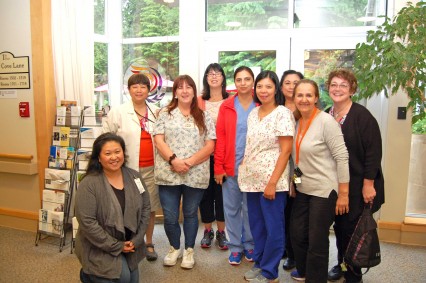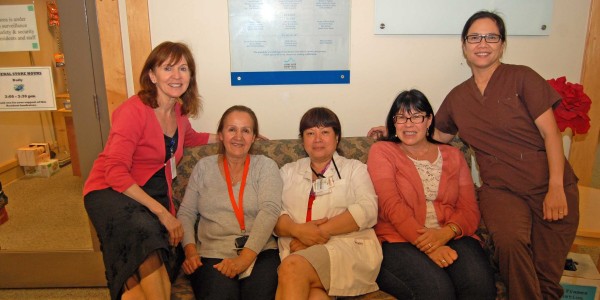End-of-life care milestone celebrated by Kiwanis Care Centre staff
At the most recent True North Forum in Vancouver, VCH President and CEO Mary Ackenhusen applauded the Kiwanis Care Centre’s success with the Daisy Project.
“The end of life work is taking off,” Mary told a packed room at VGH. “Congratulations to Kiwanis, which had no hospital deaths for a whole year.”
Kiwanis is the only VCH residential care facility that has had no reported deaths in acute care over the last 12 months.
Success thanks to staff
“Our success with the Daisy Project is due to the dedication of the Kiwanis staff who are trained in palliative care and provide supportive resources in the days before and after the loss of a resident,” says Anne Moonan-Woods, KCC Manager.
“Their commitment to the family-centred approach is always present, which is a large component of the caring model in residential care.”
Prior to the implementation of the Daisy Project in 2014, which makes end-of-life care part of the conversation with residents, families and staff, too many KCC residents were dying in the emergency department or in an acute bed, wrenched out of a familiar environment and away from everyone who knew them.
All residents registered with palliative program
Since the launch of the project, now a well-established part of the multidisciplinary palliative care practice at all North Vancouver residential care sites, 100% of Kiwanis residents who passed away were registered with the North Shore Palliative and Supportive Care Program compared to only 15% before the project. None of these residents were inappropriately transferred to acute care in their last months.
“The KCC staff have done an amazing job in accepting and promoting the Daisy Project,” says Keith McBain, Director, Residential Care & Seniors, Coastal. “The staff recognize that a resident’s final days are better spent in their home at Kiwanis Care Centre with their family and friends rather than being transferred to the hospital.”
The daisy is a symbol of love, loyalty, simplicity and purity.
Staff acknowledge each resident’s life
Kelly Foston, KCC recreation therapist, says the Daisy Project recognizes that how we die is as important as how we live.
“Often care providers, and the Interdisciplinary team that cares for a resident, become like family and they help continue the cycle of making memories of joys and struggles,” says Kelly. “By providing an environment where they are able to die in a dignified, person-centered and warm way, residents are given a heartfelt, personalized end that allows for a community of family, staff, volunteers and companions to acknowledge a persons’ life, which is the way it should be.”
“Use Kiwanis as a model”
A family member whose mother recently passed away at KCC wishes that all residential care facilities could be like Kiwanis thanks to staff and their determination to make “a home for all who enter.” She suggested “to use Kiwanis as a model for nursing homes.”
“If everyone could go to a ‘Kiwanis’ facility it would get rid of a lot of people’s stress,” commented the family member, who had taken care of her Alzheimers-stricken mother for years before finding a room at KCC. “My mum absolutely loved living at her Kiwanis home… My only hope is when it is my turn that there will be more care facilities like Kiwanis.”
“You may wonder why I am so ‘high’ on Kiwanis – well I have watched and observed many facilities over the years and yes some are OK… but I would rate the care at Kiwanis as outstanding.”

Staff at North Vancouver’s Kiwanis Care Centre celebrate their milestone achievement of no reported deaths in acute thanks to the implementation of the Daisy Project.


Bal Sahota
How we live in our world is just as important as how we leave our world. The creation of ongoing memories with comfort and respect is so important for the client, the family and possibly grandchildren. It is fabulous what each of you is contributing to the life of others through the Daisy Project. Remember to appreciate yourselves as well.!